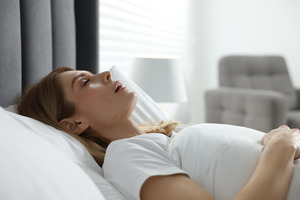How Sleep Apnea Can Affect Your Cardiovascular Health
April 18, 2025

Sleep apnea can make it very difficult, if not impossible, for you to get the rest your body needs. Not only can this leave you feeling excessively tired during the day, but it can have a severely detrimental impact on your overall health, especially when it comes to your heart. Below is a closer look at how sleep apnea can lead to serious cardiovascular issues if ignored for too long.
What Happens When You Have Sleep Apnea?
Having sleep apnea means that you are experiencing constant interruptions in your breathing whenever you sleep. Said interruptions can be a result of the brain failing to send the proper signals to control your breathing; however, in most cases, they are caused by the airway being blocked in some manner.
Whenever you have a sleep apnea episode, the oxygen levels in your blood fall. On top of that, your body is forced to wake up so that breathing can resume. While these awakenings are brief, they are enough to disrupt your sleep cycle and prevent you from getting quality rest.
How Does Sleep Apnea Impact Your Heart Health?
The low oxygen levels caused by sleep apnea episodes can put a lot of stress on your cardiovascular system. This can lead to raised blood pressure and seriously damage your blood vessels. As a result, people with sleep apnea tend to be at a higher risk for cardiovascular problems. In particular, statistics show that those with sleep apnea are twice as likely to suffer from a heart attack.
How Can You Treat Sleep Apnea?
The best way to protect yourself from the worst consequences of sleep apnea is to have it treated in a timely manner. Thus, it’s important to be mindful of any possible symptoms of sleep apnea, such as loud snoring and feeling unusually tired during the day. Such symptoms should be taken as a sign that you should have a sleep test performed as soon as possible.
If the results of your sleep test indicate that sleep apnea is present, the logical next step is to seek treatment. Traditionally, this involves using a CPAP machine to force pressurized air down your throat while you sleep, thus keeping your airway clear. However, if you find CPAP to be too noisy or uncomfortable, you may want to consider oral appliance therapy instead. A well-made oral appliance can slightly change the position of your jaw so that your airway remains unobstructed throughout the night.
Ignoring sleep apnea is never a good idea. In order to enjoy more restful nights again and protect the health of your heart, you should make a point of seeking treatment for your sleep-disordered breathing as soon as you can.
About the Author
Dr. Steven Oshins is a graduate of the University at Buffalo School of Dental Medicine. He is working toward certification as a Diplomate of Sleep Medicine, and he learned about the field of dental sleep medicine from experts such as Dr. Mayoor Patel. He offers a variety of oral appliances for treating sleep apnea. To schedule a consultation with Dr. Oshins at Oshins of Smiles in Schenectady, visit his website or call (518) 356-5635.
No Comments
No comments yet.
RSS feed for comments on this post.
Sorry, the comment form is closed at this time.
